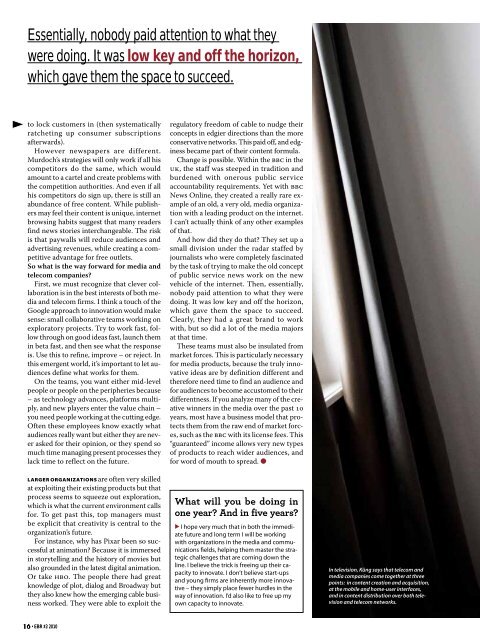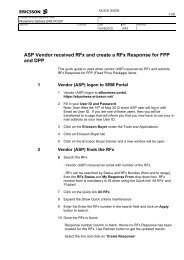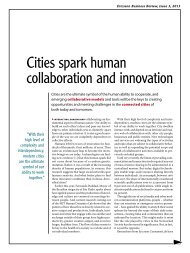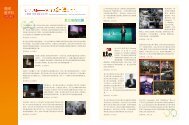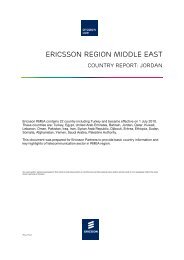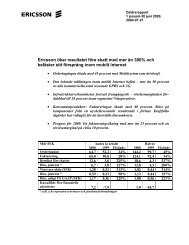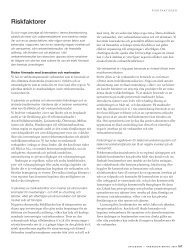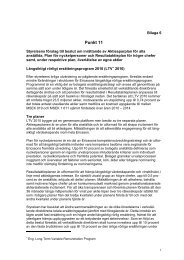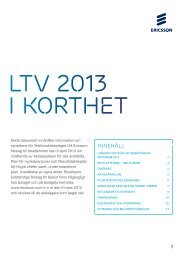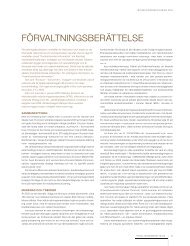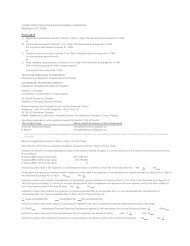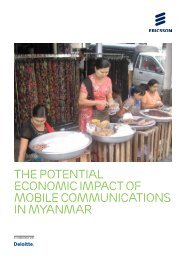Telenor's - Ericsson
Telenor's - Ericsson
Telenor's - Ericsson
- TAGS
- ericsson
- www.ericsson.com
Create successful ePaper yourself
Turn your PDF publications into a flip-book with our unique Google optimized e-Paper software.
Essentially, nobody paid attention to what they<br />
were doing. It was low key and off the horizon,<br />
which gave them the space to succeed.<br />
to lock customers in (then systematically<br />
ratcheting up consumer subscriptions<br />
afterwards).<br />
However newspapers are different.<br />
Murdoch’s strategies will only work if all his<br />
competitors do the same, which would<br />
amount to a cartel and create problems with<br />
the competition authorities. And even if all<br />
his competitors do sign up, there is still an<br />
abundance of free content. While publishers<br />
may feel their content is unique, internet<br />
browsing habits suggest that many readers<br />
find news stories interchangeable. The risk<br />
is that paywalls will reduce audiences and<br />
advertising revenues, while creating a competitive<br />
advantage for free outlets.<br />
So what is the way forward for media and<br />
telecom companies?<br />
First, we must recognize that clever collaboration<br />
is in the best interests of both media<br />
and telecom firms. I think a touch of the<br />
Google approach to innovation would make<br />
sense: small collaborative teams working on<br />
exploratory projects. Try to work fast, follow<br />
through on good ideas fast, launch them<br />
in beta fast, and then see what the response<br />
is. Use this to refine, improve – or reject. In<br />
this emergent world, it’s important to let audiences<br />
define what works for them.<br />
On the teams, you want either mid-level<br />
people or people on the peripheries because<br />
– as technology advances, platforms multiply,<br />
and new players enter the value chain –<br />
you need people working at the cutting edge.<br />
Often these employees know exactly what<br />
audiences really want but either they are never<br />
asked for their opinion, or they spend so<br />
much time managing present processes they<br />
lack time to reflect on the future.<br />
LARGER ORGANIZATIONS are often very skilled<br />
at exploiting their existing products but that<br />
process seems to squeeze out exploration,<br />
which is what the current environment calls<br />
for. To get past this, top managers must<br />
be explicit that creativity is central to the<br />
organization’s future.<br />
For instance, why has Pixar been so successful<br />
at animation? Because it is immersed<br />
in storytelling and the history of movies but<br />
also grounded in the latest digital animation.<br />
Or take hbo. The people there had great<br />
knowledge of plot, dialog and Broadway but<br />
they also knew how the emerging cable business<br />
worked. They were able to exploit the<br />
16 EBR #3 #2 2010<br />
regulatory freedom of cable to nudge their<br />
concepts in edgier directions than the more<br />
conservative networks. This paid off, and edginess<br />
became part of their content formula.<br />
Change is possible. Within the bbc in the<br />
uk, the staff was steeped in tradition and<br />
burdened with onerous public service<br />
accountability requirements. Yet with bbc<br />
News Online, they created a really rare example<br />
of an old, a very old, media organization<br />
with a leading product on the internet.<br />
I can’t actually think of any other examples<br />
of that.<br />
And how did they do that? They set up a<br />
small division under the radar staffed by<br />
journalists who were completely fascinated<br />
by the task of trying to make the old concept<br />
of public service news work on the new<br />
vehicle of the internet. Then, essentially,<br />
nobody paid attention to what they were<br />
doing. It was low key and off the horizon,<br />
which gave them the space to succeed.<br />
Clearly, they had a great brand to work<br />
with, but so did a lot of the media majors<br />
at that time.<br />
These teams must also be insulated from<br />
market forces. This is particularly necessary<br />
for media products, because the truly innovative<br />
ideas are by definition different and<br />
therefore need time to find an audience and<br />
for audiences to become accustomed to their<br />
differentness. If you analyze many of the creative<br />
winners in the media over the past 10<br />
years, most have a business model that protects<br />
them from the raw end of market forces,<br />
such as the bbc with its license fees. This<br />
“guaranteed” income allows very new types<br />
of products to reach wider audiences, and<br />
for word of mouth to spread. ●<br />
What will you be doing in<br />
one year? And in five years?<br />
▶ I hope very much that in both the immediate<br />
future and long term I will be working<br />
with organizations in the media and communications<br />
fi elds, helping them master the strategic<br />
challenges that are coming down the<br />
line. I believe the trick is freeing up their capacity<br />
to innovate. I don’t believe start-ups<br />
and young fi rms are inherently more innovative<br />
– they simply place fewer hurdles in the<br />
way of innovation. I’d also like to free up my<br />
own capacity to innovate.<br />
In television, Küng says that telecom and<br />
media companies come together at three<br />
points: in content creation and acquisition,<br />
at the mobile and home-user interfaces,<br />
and in content distribution over both television<br />
and telecom networks.


